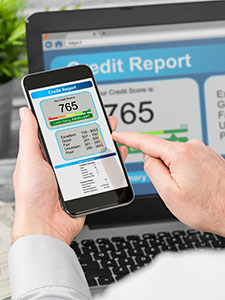POST TAGS
Blog posted On November 18, 2020

When you apply for a mortgage, your lender will evaluate several factors to determine how much money you qualify for and how much interest you will pay. Based on your application, you could qualify for a larger mortgage, buy a more expensive house, and save thousands of dollars on interest. Though all parts of your application are important, many experts recommend that you prioritize boosting your credit score to help qualify for the best rates possible.
The first step to improving your credit is knowing your credit score. While you may think you know your credit score, you might be surprised to hear there are multiple variations – each serving a different purpose for different lenders. Most lenders use the Fair Isaac Corporation (FICO) data analytics company for credit scoring, but within FICO, there are several different credit scoring models.
The most widely used scoring model is the FICO 8. The FICO 8 credit scoring model is used for auto loans, credit cards, and most other loans. In the housing industry, however, we use FICO scores 2, 5, and 4. Though the varying models evaluate the same four credit factors – payment history, credit use, credit mix, and age of your accounts – each factor is weighted slightly differently with the different models.
For example, the FICO 8 model is more critical of revolving credit lines with high balances, while FICO models 2, 4, and 5 put less emphasis on credit utilization and are more accurate for mortgage purposes. FICO scoring models 2, 4, and 5 also differ from each other slightly because they are used by three different credit bureaus. A credit bureau is an agency that gathers information about your credit history and compiles it into a report. The three main credit bureaus are Experian, Equifax and TransUnion. Each agency has its own scoring model because all three extract, analyze, and compile your credit history differently.
While a lender may request your credit score from all three bureaus, we will only use one score when making our final decision. If all of the scores are different, then we will use the median of the three scores to help determine if you qualify. If two of bureaus report the same score, then we will use that number. If you are applying with a partner, then we will draw the FICO 2, 4, and 5 median score for both you, and evaluate the lowest of the two.
According to the FICO model, which gives you a credit score between 300 to 850, an ‘exceptional’ credit score is 800 or higher. A ‘very good’ credit score is between 740 and 799, a ‘good’ credit score is between 670 and 739, a ‘fair’ credit score is between 580 and 669, and a ‘poor’ credit score is below 580.
Some aspects of your mortgage application are harder to control than others, such as your income. Your credit score, however, can be improved by changing the smallest habits, like paying bills on time, or double checking your credit report for any errors. Even just a couple points on your credit score can make a several thousand-dollar difference in interest. The higher the credit score, the lower the interest rates you qualify for. For example, the difference between an interest rate of 3% and 3.5% on a 30-year loan for $250,000 is $24,696.
So, don’t wait! Do your credit score homework today so that you can save thousands of dollars on your mortgage tomorrow. If you already know your credit score, we would be happy to discuss your mortgage rate options.